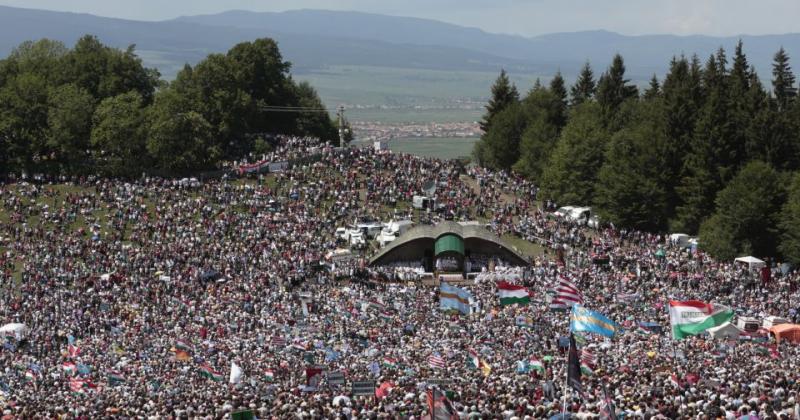Pope Francis is set to visit his third Eastern Orthodox-majority country in the space of a month at the beginning of June, traveling to Romania just weeks after visiting Bulgaria and North Macedonia.
Beyond its ecumenical dimension, the May 31-June 2 voyage will also have the pontiff spend time with a diverse minority Catholic community, which is split between a primarily immigrant Latin rite population and the Romanian Greek Catholic Church.
One of the highlights of the trip will come on its last day, when the pope is scheduled to travel to the Greek church's Transylvanian headquarters to beatify seven 20th century bishops who were each persecuted by the country's Communist era authorities and died in prison after refusing to renounce their faith.
Bishop John Michael Botean, who leads the Romanian Greek Catholic Church's only diocese abroad, said the trip will be "very, very important" for his community.
Botean, who leads the Eparchy of St. George's in Canton, Ohio, which serves Romanian Catholics across the U.S. and Canada, pointed to the pope's decision to celebrate the beatification ceremony personally.
"The big deal for me and our church is the beatification of our martyred bishops, that he's doing it himself, he's doing it in our home turf, and in a place of immense historical importance," he said.
The Romanian Greek Catholic Church counts about 500,000 members, according to the Vatican's latest statistics. Romania has a total population of about 20 million, with over 80 percent identifying as Eastern Orthodox.
During the Communist Era, Romania's leaders favored the Orthodox church, which was considered more in line with Russia. They deposed the Greek Catholic bishops, imprisoned many of the leaders, and forced the conversions of hundreds of thousands of faithful.
Speaking of the seven bishops Francis will beatify — Valeriu Traian Frentiu, Vasile Aftenie, Ioan Suciu, Alexandru Rusu, Ioan Balan, Tit Liviu Chinezu, and Iuliu Hossu — Botean called them models of fidelity to the faith, and to the Greek Catholic Church's ties to Rome.
"They were the leaders of our church, they stayed faithful," he said. "In their minds they were explicitly being faithful to the See of Peter."
"They set just a profound witness for me as examples of firmness of conscience and willingness to sacrifice oneself," he said.
Francis is only the second pope to visit Romania, following John Paul II in 1999.
"I'm looking forward to this visit being something completely different, because the pope is going to be able to go around, and he's definitely going to the peripheries in Romania," Botean said of the itinerary.
Upon arriving in Bucharest May 31, Francis will meet with President Klaus Iohannis and Prime Minister Viorica Dăncilă before giving his traditional speech to the country's political and civil authorities.
The pope will then meet privately with the head of the Orthodox church, Patriarch Daniel, before giving a public address to the church's permanent synod.
On June 1, Francis heads to visit a Marian shrine in Sumuleu Ciuc, about 175 miles north of Bucharest. To get there, the pope has to take a plane to an airbase and then a helicopter to the town.
Later in the day, Francis then takes another plane a further 175 miles northeast to visit the town of Iasi, where much of Romania's Latin rite Catholic community is based, before returning to Bucharest in the evening.
On June 2, the pope leaves Bucharest for Blaj, about 200 miles to the north; he later takes a helicopter to the town of Sibiu, about 40 miles south of Blaj, before returning to Rome that evening.
It is in Blaj that Francis will celebrate the beatification ceremony, as part of an Eastern rite Divine Liturgy. It appears to be the first time the pope has celebrated such a service.
Botean joked that when he first heard that Francis would be celebrating a Divine Liturgy in Romania, he responded, "Say what?"
